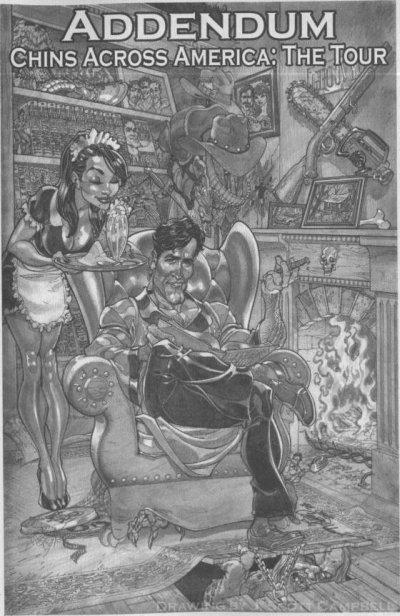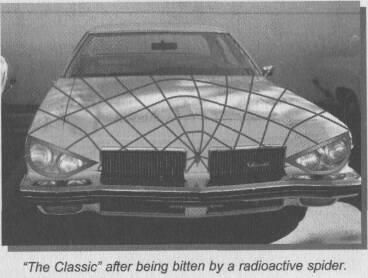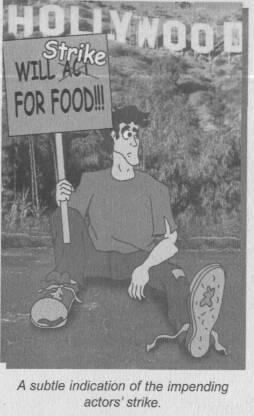If Chins Could Kill: Confessions of a B Movie Actor (54 page)
Read If Chins Could Kill: Confessions of a B Movie Actor Online
Authors: Bruce Campbell
Tags: #Autobiography, #United States, #General, #Biography & Autobiography, #Biography, #Entertainment & Performing Arts - General, #Entertainment & Performing Arts, #Actors, #Performing Arts, #Entertainment & Performing Arts - Actors & Actresses, #1958-, #History & Criticism, #Film & Video, #Bruce, #Motion picture actors and actr, #Film & Video - History & Criticism, #Campbell, #Motion picture actors and actresses - United States, #Film & Video - General, #Motion picture actors and actresses

Still, it gave us a chance to voice why we liked working on the show. For me, it was the most creative atmosphere I have ever worked in. The directors, writing staff, and the actors all shared a genuine desire to make a good show, and the producers, much to their credit, gave us the support and the leeway to do it.
My agent and manager always hated when I went down to New Zealand. To them, I was wasting my time working on a syndicated "guilty pleasure" -- out of touch, out of sight and most certainly out of the mind of Hollywood.
Frankly, I can never be far enough from Hollywood. What my representatives failed to understand, being infested with deadly spores, was that New Zealand represented a place where we could be free from studio interference, politics, parties, and misguided ambition.
Hard as I tried, I could never fully explain that I had grown weary of chasing that elusive Fame Train and was far more interested in revisiting those childhood summers of Super-8 films, when it wasn't about money or status. I wasn't working on
Herc
and
Xena
to advance my career -- I was doing it to have fun.
51
WHAT YOU DON'T SEE IS WHAT YOU GET
To one way of thinking, actors have a charmed life -- we are artists, free to express childlike emotions and we are pampered beyond reason. When working, we travel first class, stay in fancy hotels, are driven to and from work, have a comfortable place to hang out during the day and get free lunches.
As a fringe benefit to this public life, actors are recognized, applauded, awarded, revered. Then, of course, there is the issue of money -- a well-paid actor can get more for a single job, not counting residuals, than a teamster and his extended family would ever hope to earn in an
entire lifetime.
To another way of thinking, actors are a miserable lot -- they are insecure, vain and temperamental, clawing about in a world more competitive than almost any other profession. How many rocket scientists would line up around the block, in the rain, lobbying to work for just one day?
Actors face rejection weekly and are willing to tolerate years of subhuman living conditions, all in the hopes of being "somebody." Still, ninety-seven percent of them will fail -- on average, Daddy's sperm has a better chance of fertilizing Mommy's egg than an actor has of succeeding.
As actors age, the pressures to remain eternally young are almost unbearable. A plumber will never hear the phrase: "I'll hire you, but you need to lose twenty pounds."
Well-known actors are hounded by the media and approached by complete strangers. I feel fairly confident that Joe Bob factory worker never has his garbage searched by tabloid reporters and almost never gets undergarments in the mail.
Actors may enjoy fame, but they also face public ridicule when they cannot live up to their on-screen personas. Subjective notions of success and failure are shoved in the faces of people whose shelf life is about as long as cottage cheese on a July afternoon.
Once you look past the hype, actors are nothing more than fugitives from reality who specialize in contradiction: we are both children and hardened adults -- wide-eyed pupils and jaded working stiffs.
I've enjoyed being an ad-hoc member of the film business and I'm grateful for a unique, fly-on-the-wall perspective -- hovering around the white-hot center of the big H, but never quite close enough (or is it high enough?) to crash and burn.
I've had the opportunity to meet fascinating people and see places I normally would never have ventured. I've delighted in learning new tricks, refining others and discarding enough bad ones to make a decent living in a very hard profession. If that isn't glamour, I don't know what is...
In movie terms, this
Chins
"addendum" isn't really a sequel, or even a remake of the book. More than anything, it's a literary rewind of five months on the road, in and out of fifty-five cities, selling this very book.
The general concept of a "book tour," as it's known in publishing circles, was not entirely new to me. As an actor, I'd done a number of press "junkets," been on "press tours," and gone to "sales events" ad nauseam. Notwithstanding,
nothing
could have prepared me for the challenges of a book tour.
For starters, promoting a book is different from a motion picture simply by way of timing. With a film, all the hype starts months, or in some cases years, before its release. With a book, promotion happens
during
its release. Therefore, to do a book any justice, both free time and release date have to experience a wonderfully harmonic convergence. As an actor, without a full-time "job," scheduling a book tour seemed easy -- theoretically.
With a fixed publication date of May 15, 2001, the three months prior turned out to be nothing short of insane. My priority was getting the book manuscript in final shape. That's a tricky process where you decide what really stays and what goes. As trusty stewards of the word, I'm thankful for the wise editorial work and the fastidious copyediting, so that these rambling words of mine made sense.
Concurrently, we had to finalize graphics, photo placement, and complete the legal clearances. That all would have been doable if I had absolutely nothing else to do, but the acting gods, those little tricksters, demanded that I work on
five
different films during this same time.
It all started with a simple idea to do a documentary about land use issues. My wife Ida and I decided to interview locals about various issues, then present it simply and impartially as a public service type of thing. For obvious reasons, land stewardship is a topic of immense proportion and complexity. After shooting forty hours of footage on the subject, we had to take a break and see what had been accomplished.
During that shoot, which lasted four weeks, I ducked out to Los Angeles for a week to work on buddy Sam Raimi's
Spider-Man.
It worked out quite well, actually, because I needed shots of Sam's car for the
Chins
book -- for all the years I'd spent around that damned thing, I didn't have a decent picture of it.
Fate smiled on me as I was driven to the
Spider-Man
set on Sony's back lot. As we passed an open soundstage door to my right, I glanced inside. What I saw wasn't a set being built for some cool new Hollywood blockbuster, but Sam's self-proclaimed "classic."
"Stop the van," I shouted.
Earl, the driver, was flustered. "Why, what's wrong?"
"That's Sam Raimi's car, isn't it?" I asked knowingly.
Earl looked back at me, nervously. "Why... why do you want to know?"
I then realized that Earl, a loyal teamster, wasn't going to spill the beans. For all he knew, I was a fan boy freak who just wanted to crawl inside Sam's car and take a nap. To find out the truth, I had to go to the top of the transportation food chain.
"Earl," I nodded grimly, "take me to your Captain."
"Okay, boss," Earl nodded back.
At the transpo office, after confirming my lengthy relationship with Sam to Earl's boss, which included an embarrassing photograph and the promise of a signed
Evil Dead II
poster, I was allowed to ask about "the classic."
"So, look," I explained, "I just have to take a few pictures of it and I --"
"It?" The captain shot back. "You mean
them?"
"Them? I only saw one. How many are there?"
"Try four. They're out back."
In parting, the Captain told me how to identify Sam's "original" car, and I proceeded to document every inch it.
Back from Los Angeles, Ida and I finished shooting the documentary, the first phase anyway, and I immediately fell into another film called
Servicing Sara
(now officially known as
Serving Sara
). I use the term "fell in" because that's how actors get cast in parts sometimes.
On a chilly December day up here in Oregon, I was on my leaky balcony (now repaired) and I got a call from director Reggie Hudlin who proclaimed that he would like to have me in his next film. The thought of playing a Texas imbecile immediately appealed to me, so I jumped all over it.
I think the Screen Actors Guild had as much to do with landing the role as Reggie did. Around the first part of 2001, the Screen Actors Guild threatened that unless serious progress was made in the already stalled talks, a strike was going to happen. Movie studios, fearing a work stoppage, which would translate into a cash flow stoppage, flew into a panic and forced dozens of projects into production -- ready or not. For the first time I could remember since becoming a professional, actors were scarce.
Under normal Hollywood conditions, for me to be cast as a third lead opposite Matthew Perry and Elizabeth Hurley, I would have had to endure meetings, readings, camera tests, lobbying, favor-swapping, etc. Whatever the real reason, during Hollywood's temporary need, I found myself cast as a goofy, rich Texan in this romantic comedy.
But that wasn't enough. In the middle of sending legal clearances for book photographs halfway around the world, it seemed important to heap more onto my soggy paper plate. The Jim Carrey film,
The Majestic,
required a swashbuckling character to star in the film-within-a-film. When the offer came from Hollywood nice guy Frank Darabont, what was I gonna do, say no? Hell, it was perfect -- Jim would star in the A film, and I would headline the B.





